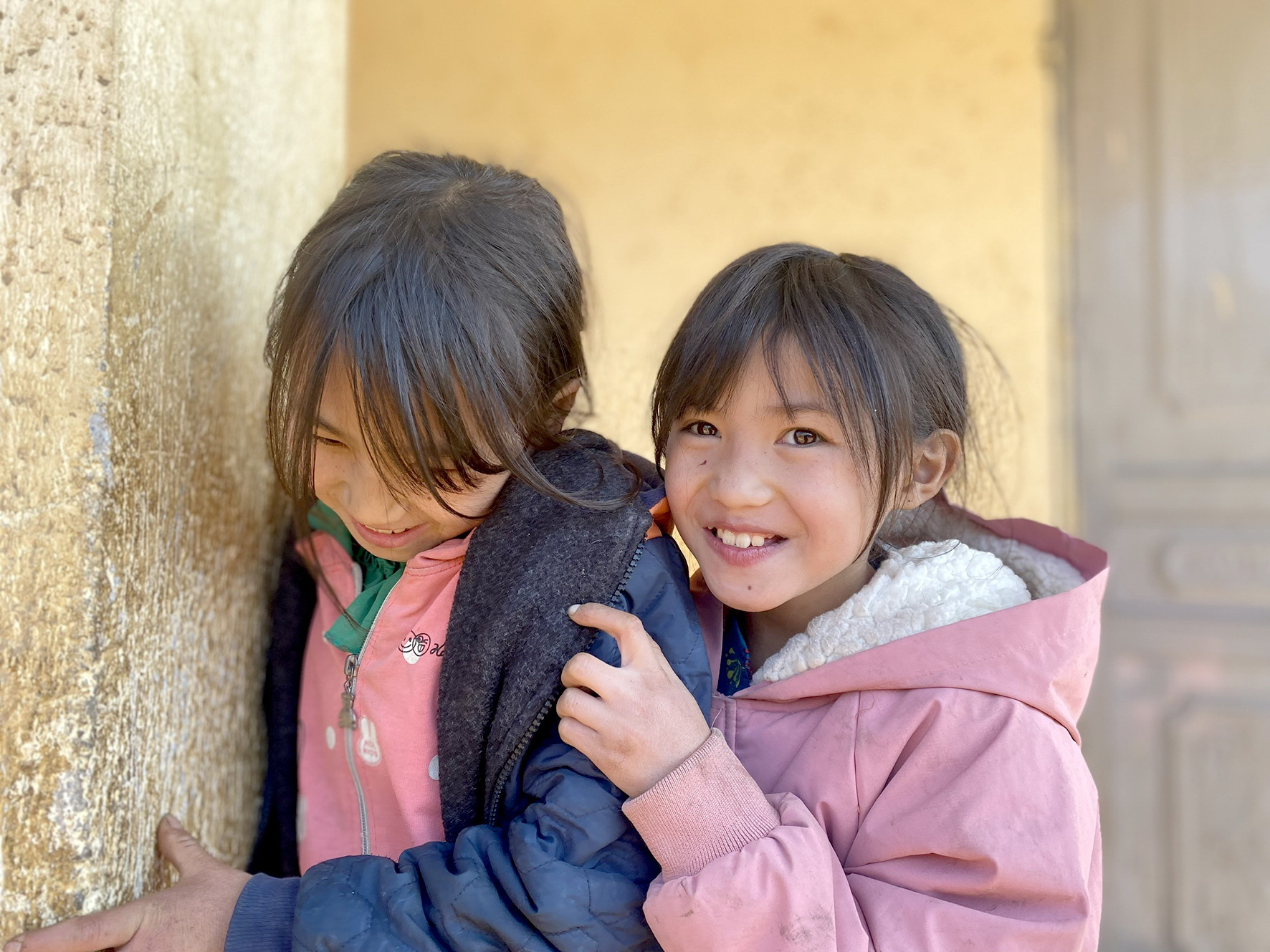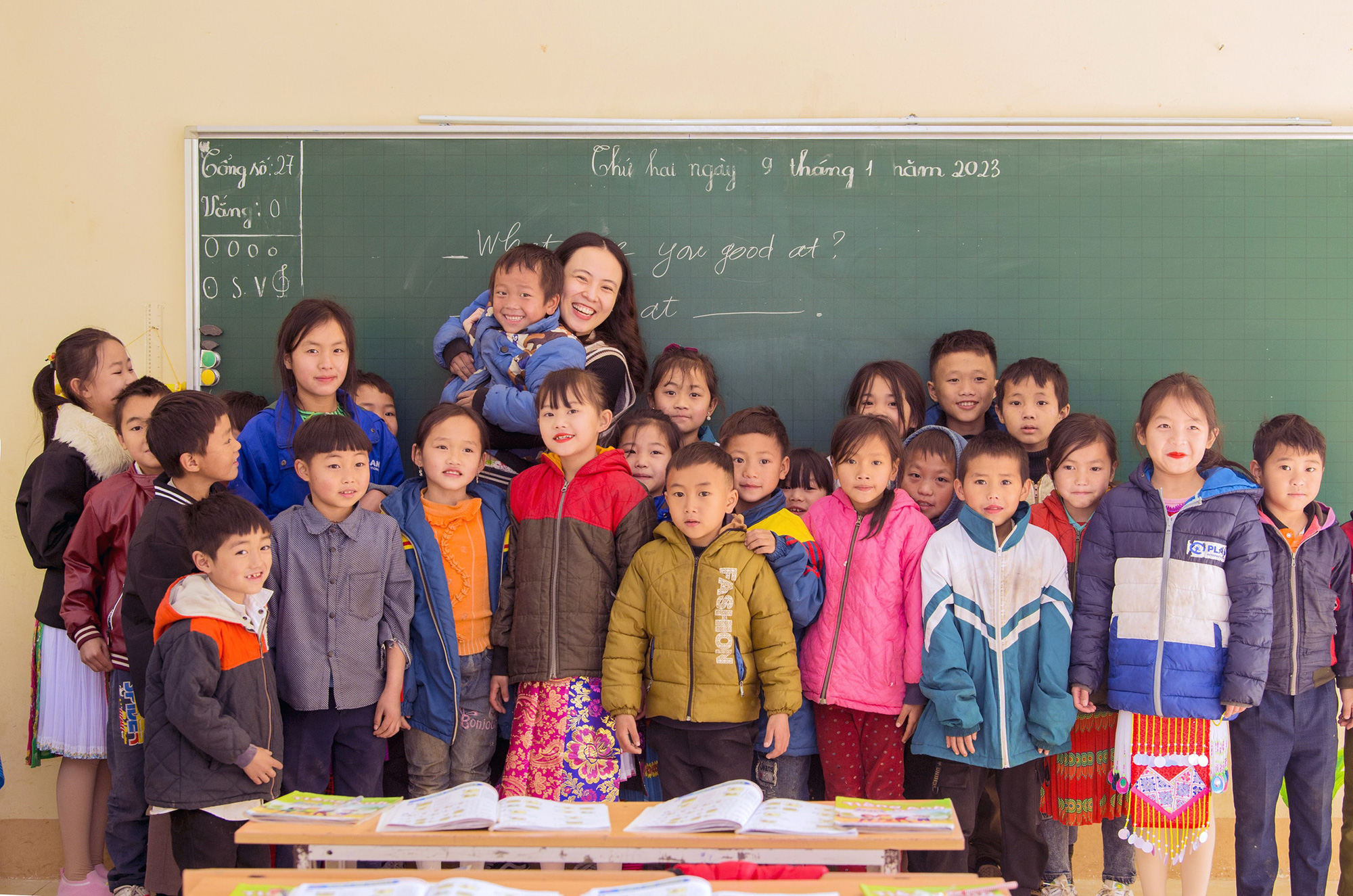"The students scurry and circle around me. It surprised me to see how much they love me even though they have only seen me through the screen before," said Quynh Anh, an English teacher, recounting her emotional moments when she had the chance to meet her students in Meo Vac, a rural district in the northernmost province of Ha Giang, after teaching them English courses online.
Quynh Anh is one of more than 20 young teachers who participated in a project launched by Marie Curie High School in Hanoi to teach English online to third graders at 18 elementary schools in Meo Vac District.
The teachers traveled to Meo Vac specifically to see the students in person for the first time after hundreds of hours of online instruction as the first semester ended just before the Lunar New Year (Tet) vacation in January.
There is no distance anymore
At 6:00 am, teachers excitedly called each other to visit their students in the freezing weather in the northern mountainous province of Ha Giang.
While some of them were picked up by vehicles from the district administration, others were transferred on the motorcycles of local teachers or people from Meo Vac.
For many teachers, it was the first trip after the first semester of online learning to meet the students for the first time.
Among the teachers who have traveled nearly 400 kilometers from the capital city to the center of Meo Vac is Nguyen Minh Hong, who is in charge of teaching English to third grade students at Son Vi Elementary Boarding School, which is located in the most remote region, about 52 kilometers from the center of Meo Vac.
While visiting the students, Hong had her first experience of driving on the narrow, winding, unpaved roads in the mountains.
On the road that runs along rocky cliffs, Hong felt that she might be thrown out of the car because of the rough road.
However, the challenges of the journey made the meeting a very special memory.
Like other teachers that day, Hong took advantage of the time to teach an English lesson in person or do some activities to help students better communicate with teachers later in online classes.
In addition, she had a special experience when she visited a fair in the mountains with her students.
"The children seem to be rather shy at first, but later become more open. Especially, many of them want to hold the teacher's hands. There is one student who does not say anything at all, but just holds my hands to show emotion," Hong recalled.
Quynh Anh, who taught online English classes to third grade students at Sung Tra Day School for Ethical Groups, recalled how much she cried the moment she met her students in person for the first time.
"The students were scurrying and circling around me, which gave me unspeakable feelings. It took me back to see the students love me so much even though they had never seen me in person," she said.
"Then I realized that the students were so small compared to what I had imagined before meeting them," Quynh Anh recalled.
Due to an unexpected incident, one teacher was unable to join the trip.
Nguyen Thi Nga had to come to a school where she taught online classes instead of the Xin Cai day boarding school for ethnic group students.
Although Nga could not meet with her students, they sent her a package with charming letters and pictures expressing much love.
One letter from Giang Thi Va said, "Dear teacher, you had made an appointment with us but could not come. We look forward to seeing you every day. We love you so much."
At the end of the letter, the little girl wrote a sentence in English: "My name is Va."
The letter inspired her a lot, Nga said.
It spurred her to stay involved with the students in the mountains, and she believes that one day she will visit the Meo Vac District to see her students and make good on her promise.
 |
| Children in Thuong Phung Commune, Meo Vac District, Ha Giang Province. Photo: Vinh Ha / Tuoi Tre |
Overcoming obstacles together
According to Nguyen Thi Minh Tam, director of Giang Chu Phin Day Boarding School for Ethnic Students, it was necessary for third grade students to go to the main school to meet the requirements of the new general education curriculum with English and computer science, instead of studying in remote education centers as before.
"Many students have to travel a long distance of 15 to 20 kilometers, and in some cases up to 25 kilometers. They return home on weekends.
"While some of them are carried a short distance to school by their parents on the way back, many students have to walk the distance from home," Tam told of the difficulties students in the rock highlands face every day.
"To get to school on time, they do not take the main road, but a shortcut to shorten the time, having to climb a lot as the sky is quite dark. In winter, the temperature sometimes drops too low, and there can be heavy fog," Tam adds.
In addition, there are difficulties that seem to go beyond the efforts of the teachers and students in the mountains, especially when it comes to teaching English.
"The students are really well-behaved, but it's a challenge to teach English online if they are too timid or some students are not yet fluent in Vietnamese," shared Dang Thi Quynh Trang, who is in charge of teaching English to students at Ta Lung School.
"Also, there are some cultural differences that require teachers to be much more patient," she continued.
According to Trang, it became a difficult task for her to explain vocabulary words such as "television," "dining table," "kitchen," "bed" because they never see them in life, which means there is no TV in their homes, and they never sleep in a bed.
For this reason, Meo Vac teachers have to be in class at the same time during online English lessons to support their colleagues in case they need help.
"We always have to think about how to design lectures and activities to get students to learn and interact with teachers," said Vu Nhat Nhat, a teacher.
"Teaching methods need to change frequently, we need to use more pictures, photos, cartoons and videos to help students get used to a "new world" and to stimulate their imagination," she added.
In the face of such efforts, student progress, albeit slow, can make teachers' day. The results of the first semester were a surprise when many of the students received high marks, Tam said.
"Considering the tests were administered by Meo Vac District teachers, those results are trustworthy," Tam said.
A unique project
In the 2022-23 school year, grade-3 students will learn English as a compulsory subject for the first time under the new General Education Program 2018.
Previously, English was an elective subject.
In Meo Vac, although there are 2,609 students with 76 grade 3 classes, there are only 25 English teachers, including only one primary English teacher.
Although English teacher salaries have been increased, the district has not been able to hire enough teachers.
To address the shortage of English teachers, Meo Vac's Education and Training Bureau intended to gather all grade 3 students in one location and then use high school teachers to teach online.
However, the plan initially encountered many difficulties from both teachers and students.
According to Bui Van Thu, head of Meo Vac District's Education and Training Bureau, while they were stuck with the plan, he had the chance to meet Nguyen Xuan Khang - the principal of Marie Curie High School in Hanoi - through a charity project of the school.
After receiving a commitment from Khang to help teach English online, Thu sat up nights trying to find solutions to make the idea a reality, because teaching English as a compulsory subject in the curriculum is a drudgery far from helping weak students after school or providing lessons to students who cannot read and write.
Initially, they wanted to hold an online English class at each school, but the plan is impossible because of the large number of students.
"Finally, we decided to have many small classes, which forced us to hire more teachers to teach in Meo Vac," Khang recalled.
To that end, 22 young teachers were hired, including experienced ones who graduated last year with degrees in English language or English pedagogy. It is not easy to carry out the project, which requires "a warm heart," Khang said.
With three lessons per week per class, after 35 weeks and with 76 classes, Marie Curie High School has helped all grade 3 students with 7,980 lessons in one school year.
Teachers are real!
"We were once concerned that the kids thought English teachers were not real, but just on TV. So, the meeting was absolutely meaningful to them," said teacher Quynh Trang said.
"The children's pure love, as well as their expectations and trust, are precious gifts for us," she added.
According to Bui Van Thu, online English classes have helped Meo Vac schools overcome initial difficulties.
Moreover, the strong relationship between teachers from the capital city and students from the mountains is an inspiring story against the backdrop of the many challenges of teaching and learning in a mountainous border district such as Meo Vac.
Like us on Facebook or follow us on Twitter to get the latest news about Vietnam!



















































